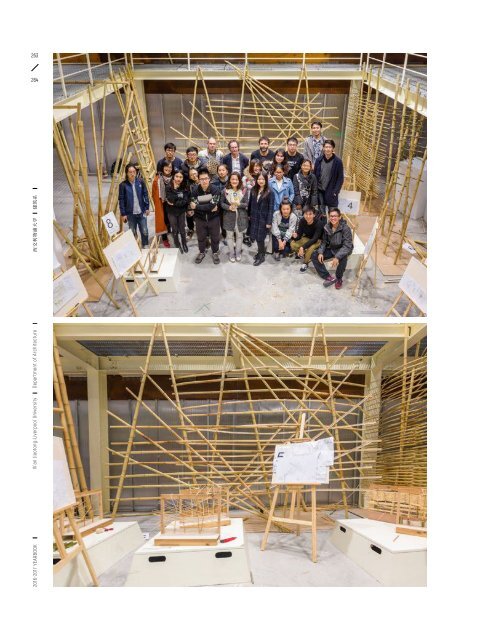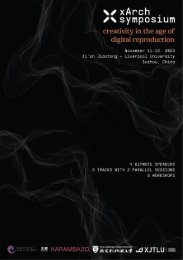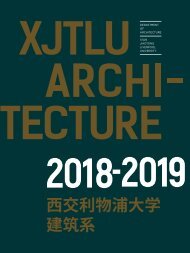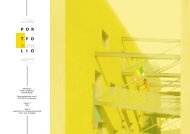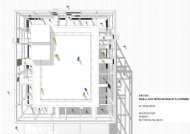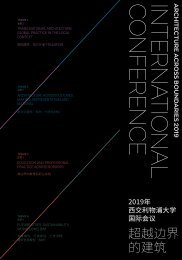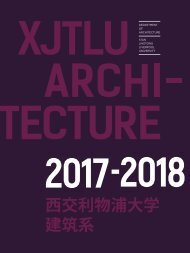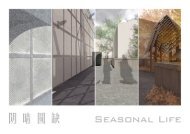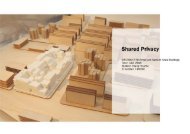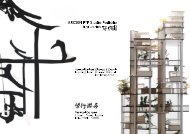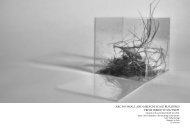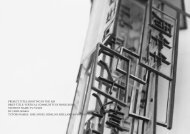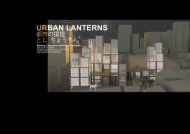YEARBOOK 2016 - 2017 | XJTLU DEPARTMENT OF ARCHITECTURE
The fourth edition of the yearbook of the Department of Architecture at Xi'an Jiaotong-Liverpool University presents student works created during the academic year 2016 - 2017. The yearbook exemplifies the new model for Chinese architectural education for which the department was commended by the Royal Institute of British Architects (RIBA). It is thus also a showcase of the creative culture that has guided our students in taking first steps to successful international careers as responsible and creative architectural designers. XJTLU offers RIBA Part 1, 2 and 3.
The fourth edition of the yearbook of the Department of Architecture at Xi'an Jiaotong-Liverpool University presents student works created during the academic year 2016 - 2017. The yearbook exemplifies the new model for Chinese architectural education for which the department was commended by the Royal Institute of British Architects (RIBA). It is thus also a showcase of the creative culture that has guided our students in taking first steps to successful international careers as responsible and creative architectural designers. XJTLU offers RIBA Part 1, 2 and 3.
You also want an ePaper? Increase the reach of your titles
YUMPU automatically turns print PDFs into web optimized ePapers that Google loves.
263<br />
264<br />
BAMBOO WORKSHOP<br />
<strong>2016</strong>-<strong>2017</strong> <strong>YEARBOOK</strong> Xi’an Jiaotong-Liverpool University Department of Architecture 西 交 利 物 浦 大 学 建 筑 系<br />
Workshop Leaders<br />
Juan Carlos Dall’ Asta<br />
Ruggero Canova<br />
Winning teams<br />
Yuanxin Zhao and Rui Lu<br />
Yu Yulin and Yuqi Shen<br />
Zou Yina and Luo Cong<br />
Lu Xiaohui and Yuanfeng Hu<br />
Arising as a shared initiative between the Department of Architecture<br />
and the Department of Industrial Design, the Bamboo Workshop was<br />
organized by Juan Carlos Dall’Asta (ARCH) and Ruggero Canova (IND)<br />
as the first didactic initiative hosted by the Materials Library located in<br />
the Design Building on 23rd November <strong>2016</strong>. The workshop’s intention<br />
was that students experiment with different ways of using bamboo to<br />
generate constructive patterns for the Materials Library’s feature walls.<br />
In only 7 hours, ten Year 3 Architecture students and ten Year 4 students<br />
of Industrial Design, organized in mixed groups of two students, had an<br />
excellent opportunity to explore the importance of “thinking with their<br />
hands”, to investigate research methodologies through making or, as it is<br />
otherwise known, research by design. The workshop enabled students<br />
to transform abstract concepts into technical solutions in the knowledge<br />
that ideas must be open to improvements during the construction stage,<br />
highlighting how the building process itself plays an important role in<br />
design.<br />
Three established craftsmen from Shanghai instructed the twenty<br />
Architecture and Industrial Design students in the art of building with<br />
bamboo, providing them with the opportunity to experiment through<br />
making at 1:1 scale, drawing out the inherent beauty of the material.<br />
After many hours of prototyping and testing their concepts students<br />
gained in confidence and became quick and adept in weaving and<br />
assembling bamboo poles and strips. And by late evening everybody<br />
involved was astonished by the ten huge and diverse installations<br />
surrounding the central room of the Library.Each work expressed, albeit<br />
in different ways, delicate and clever designs which brought out the<br />
potential of this meaning-rich material.<br />
At the completion of the workshop, four teams were awarded the “best<br />
design” which will be ideally realized in the completion of the Materials<br />
Library.<br />
Other Activities


